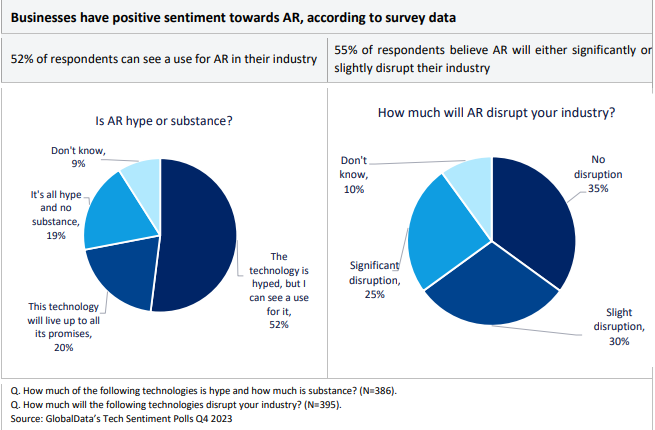
Inflation is proving to be a barrier to the uptake of augmented reality (AR) among both businesses and consumers, according to a new report.
GlobalData’s Augmented Reality in Retail and Apparel report explains that the macroeconomic climate in recent years has been one factor at play in retailers being “focused on controlling their operating costs over investing in new technologies.”
It also notes: “High inflation and the increased cost of living are limiting consumer spending as shoppers re-evaluate their priorities and cut back on nonessential items.”
Despite these findings, over half (52%) of businesses feel positive about the potential of AR, reporting that they see a use for the technology in their industry, and 55% believe that it will prove ‘significantly disruptive’, per GlobalData’s Tech Sentiment Polls Q4 2023 cited in the report.

The augmented reality (AR) market will be worth a projected $100bn by 2030, and it is suggested that retailers can harness technology to offer a competitive advantage in a market struggling with inflationary pressures.
Higher prices are driving consumers to prioritise affordability over loyalty, with GlobalData’s Q4 2023 Global Consumer Survey finding that 88% of respondents were either ‘quite concerned’ or ‘extremely concerned’ about the impact of inflation on their budget. However, investment in shopping experiences can serve as a selling point for retailers looking to stand out.

US Tariffs are shifting - will you react or anticipate?
Don’t let policy changes catch you off guard. Stay proactive with real-time data and expert analysis.
By GlobalData“Retailers that invest in AR technologies can revolutionize the personalised shopping experience and improve it for consumers, both in-store and online …” the report explains. “This gives consumers a deeper understanding of the product’s features and benefits and can speed up purchasing decisions.”
Among the uses commended in the report was experiential marketing. Immersive experiences can engage consumers otherwise lost in the crowded market, both in-store and on personal devices, it suggests.
Benefit Cosmetics used AR in its marketing, with a virtual media campaign to advertise its new mascara. AR-enabled devices allowed users to find virtual tokens in physical spaces, combining the digital and real worlds. Tokens could be changed for discounted mascara or virtual beauty consultations. The campaign secured a reported conversion rate of over 50% and click-through rate of 39%.
Considering the difficulty of shopper retention in a period of significant inflation, the report concludes: “AR offers a fresher way of delivering product information, creating memorable experiences that capture the attention, arouse curiosity, and increase consumer engagement. Customer-centric AR experiences can help differentiate retailers in a crowded market, strengthen customers’ relationships with brands, and maintain customer loyalty.”




